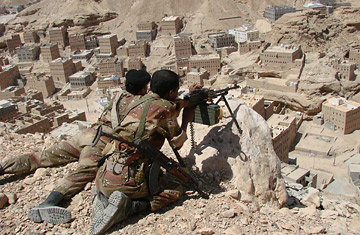
Yemeni army troops take position in the hills overlooking the southern town of Huta on Sept. 27, 2010, three days after regaining control of the town from suspected al-Qaeda militants
Pakistan's tribal wilds may get all the headlines, but the impoverished desert wastes of Yemen are fast emerging as a major front line in the war against al-Qaeda. In recent weeks, al-Qaeda-affiliated forces have launched numerous strikes against Yemen's U.S.-backed government and military, even closing in on employees of the state intelligence services. The jihadists have racked up some victories, lost some men and offered a sobering glimpse into how tight-knit, nimble insurgent units can rise within a few short years and threaten huge damage to Western interests — despite the U.S. spending countless billions of dollars fighting terrorism.
"Al-Qaeda in the Arabian Peninsula has a pretty free hand to do what it wants," says Nigel Inkster, former deputy director of Britain's MI6 intelligence service and now a Yemen expert at London's International Institute for Strategic Studies. "They are smarter and more strategic than before, and they look more threatening."
The current offensive has seen Yemen's 65,000-man military fight its first-ever battles against al-Qaeda fighters, attempting to contain growing terrorist attacks that could cripple its fragile economy and — more worrying for the U.S. — spread to neighboring Saudi Arabia, the world's biggest oil producer and a close U.S. ally. The fighting erupted on Aug. 19, when armed jihadists killed at least two Yemeni soldiers in a crowded market in the southern town of Lowdar. After years of Yemen's government relying on low-key negotiations to ward off threats from al-Qaeda in the Arabian Peninsula (AQAP), as the regional branch of al-Qaeda is known, the government dispatched soldiers to Lowdar to try to rout the militants from the area.
That was just the opening salvo. A group of AQAP fighters then converged in al-Huta in the southern province of Shabwa on Sept. 21 and attempted to blow up Yemen's most strategic asset, the 199-mile natural-gas pipeline that snakes down to a gleaming new harbor in the Gulf of Aden. The $5 billion project — Yemen's biggest-ever investment — opened last November in partnership with the French energy giant Total, and its huge export contracts with the U.S., South Korea and other countries will bring desperately needed revenue. Yemeni forces managed to prevent the pipeline attack and then blockaded the area of al-Huta, where the militants were holed up. Despite that, several fighters appeared to have escaped capture, according to Yemeni journalists who also reported that both sides had suffered casualties. The English-language Yemen Observer said last week that the government was planning an all-out assault on al-Qaeda, using fighter jets and Yemen's U.S.-trained special forces.
But the jihadists have escalated the fight. Gunmen last Saturday ambushed a bus carrying guards for Yemen's intelligence service in the capital Sana'a. The ambush came a day after U.S. and Yemen officials met in New York City to push for increased economic aid and five days after President Obama's chief counterterrorism adviser, John Brennan, met President Ali Abdullah Saleh in Sana'a to discuss how to tackle al-Qaeda. U.S. Central Command has proposed a new $1.2 billion package of aid to bolster the capabilities of Yemen's military against al-Qaeda.
President Obama also recently authorized U.S. operatives to capture or kill the radical U.S.-Yemeni cleric Anwar al-Awlaki, who is believed to be hiding about 60 miles from al-Huta. Al-Awlaki's hard-line preaching on the Internet is believed have inspired alleged Fort Hood shooter Major Nidal Malik Hasan and Nigerian Umar Farouk Abdulmutallab, accused of attempting to bomb a Detroit-bound airliner last Christmas. The American Civil Liberties Union and the New York City–based Center for Constitutional Rights have filed suit against the Administration for ordering a lethal attack against al-Awlaki, who is a U.S. citizen.
Part of AQAP's effectiveness lies in its having learned from al-Qaeda's mistakes in Iraq, where its brutal tactics alienated locals, according to Inkster. The organization has also joined forces with al-Qaeda militants from Saudi Arabia, so that now, "Saudi Arabia is unquestionably their key focus," he says.
AQAP appears to have reorganized itself with remarkable swiftness after a 2006 jailbreak in Sana'a freed 23 imprisoned militants. The escapees included Jamal al-Badawi, who masterminded the attack on the warship U.S.S. Cole off Yemen's coast in 2000, in which 17 U.S. sailors were killed. Al-Badawi surrendered to Yemeni police in 2007, but was freed after pledging allegiance to President Saleh and promising to refrain from al-Qaeda activities. The FBI still has a $5 million reward out for al-Badawi, whom it lists as one of its most wanted terrorists.
Yemen analysts say Saleh's regime has until recently been deeply ambivalent about confronting al-Qaeda militarily, for fear of losing its tenuous grip on power in a country riven by tribal conflicts. And being seen to be reliant on U.S. military assistance exacerbates the problem. "Yemen doesn't want to be seen as complicit with the U.S.," says David Bender, Yemen expert at the Eurasia Group in Washington, D.C. "The Yemen government is very weak," he says. "Politics in Yemen is very decentralized, and everything is negotiated." Besides al-Qaeda, Saleh also faces localized rebellions by separatists in the south and Shi'ite Houthi insurgents in the north.
Despite Saleh's nervousness about his ties with Washington, the growing U.S. military involvement in Yemen is becoming difficult to conceal. "Direct engagement [in Yemen by U.S. forces] could make a drama out of a crisis," Inkster warns. "It would be a good idea if the U.S. measured its steps very carefully before it acts."
